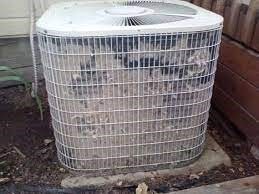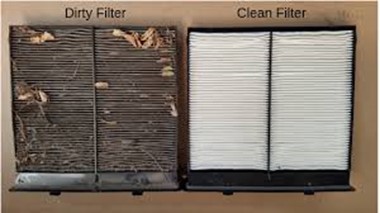Is Annual Professional Central Air Conditioner Maintenance Worthwhile?
- Central Air Conditioner maintenance is very important to do every year – ideally in the spring.
- Sometimes it’s called an A/C tune-up, but usually it’s more preventive maintenance than a “tune-up.”
- Hiring a professional isn’t very expensive – unless they find problems. But an honest AC technician can tell you what needs to be fixed now so you can avoid bigger problems later.
- The cost of professional AC maintenance is usually between $70 to $200 and takes one to two hours.
- If you hire a professional, make sure they’re reputable. If you hire a random air conditioning technician they could easily claim you need expensive repairs that aren’t necessary.
- Alternatively, you could do some basic maintenance yourself if you want to save money.
- If your air conditioner is under warranty, it might require annual maintenance (but not necessarily by a professional). Check to see what your warranty requires.
- Air conditioning manufacturers recommend a tune up each year to keep it running at peak performance and improve its life expectancy. Not doing routine maintenance can lead to higher utility bills. Plus, a tune up can catch problems before they cause a system failure requiring emergency repairs.


What services are included in professional air conditioning maintenance?
A/C tune-ups include many of the following items. Not all technicians will do everything on this list, so you should ask them what’s included. If you’d like them to check something they don’t normally do – ask!
- Make sure the system is running safely.
- Check the air filter, and replace or clean, if not already done yourself.
- Check your thermostats to make sure they’re working.
- Make sure all electrical connections are tight/safe and components are working properly.
- Inspect/test contactors and capacitors
- Inspect the compressor
- Check refrigerant levels and check for refrigerant leaks. Recharge if necessary.
- Measure supply/return temperature differential
- Make sure the outside unit has good airflow. Remove debris accumulation (leaves, etc.) from inside and outside the outdoor unit.
- Check and clean condenser coil and fins. Outer casing might need to be removed to clean properly
- Inspect your ductwork for leaks.
- Check indoor evaporator coil for blockage and apply self-rinsing cleaner if needed.
- Check and clear the condensate drain line to prevent water backup that could cause water damage or humidity issues.
- Lubrication of all moving parts (motors/bearings…) to eliminate friction and wear that can increase your energy costs.
- Test your system’s controls and safety mechanisms
- Inspect the blower motor in the air handler and (in older units) the condition of the blower belt. Clean and adjust as needed. Check the blower motor’s amperage and voltage for proper operation
If I don’t hire a professional, what should I do myself?
- Change your air filter. Experts recommend changing your air filter every three months or so for a typical house. You should consider changing it more often if you live in a dusty climate, have pets, or have allergies/respiratory conditions. If your air filter is very dirty when you replace it, consider changing it more often. If you suffer from allergies or respiratory conditions you could benefit from a high efficiency filter. But it’s best to ask a professional before installing one to make sure your air conditioning system is compatible.
- Remove all debris from inside and around the outdoor unit. Sticks, leaves, and straw often accumulate within and next to your outdoor unit. Removing them can improve AC efficiency and help prevent the condenser coils from getting dirty again after cleaning them.
- Clean the condenser coils. [Helpful YouTube videos from Word of Advice TV, The DIY HVAC Guy, How to Home] [Tips from TheSpruce.com]
Watch out for the following signs your AC needs servicing:
- Your electric bill is higher than expected
- Air flow from the vents is weaker than normal
- Air from the vents is not cold
- AC is not able to keep your house cool
- Air conditioner turns on and off frequently or constantly runs
- Humidity inside your house is higher than normal
- Unusual odors or electrical smells
- Vibration or other noises
